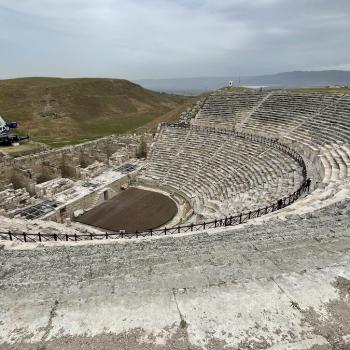
When the kids were growing up, one of our favorite winter activities included pond hockey. In the cold northern Illinois months between November and February we were virtually guaranteed thick ice on the pond out back of our house. Some years were better than others. Nevertheless, we spent many hours on the ice as neighborhood kids and some parents would come to play at the Coopers.
By the time the kids began High School, competition grew increasingly intense. Their skills with a hockey stick and puck matured. Their ability to check me into a snow bank left an occasional bruise. And they began skating faster. So, naturally they challenged me to the customary post game race around the goals to see how their speed on the ice topped mine.
And naturally the inevitable would happen. It occurred after an intense one-on-one match with our oldest son Zachary. Perhaps the match ended in a tie, I don’t exactly remember. But, the obligatory race would settle the bragging rights for at least that day. And we were off! Heading for the turn around the far end goal, my right skate found a crack in the ice at just the precise moment when I leaned into the sharp turn back to the finish. We were neck and neck when all of a sudden my skate decided not to go where my body was going. And pop! My ankle snapped. It was loud enough that even Zachary heard it as he headed on his way to the finish.
Mending Broken Bones
I’ve been fortunate enough to have never broken a bone up to that point in my life. I’ve been puncture by nails, scrapped by asphalt, turf burned, stitched, and bandaided, and visited the emergency room a few times, but never a fracture. Yet no different than any other injury, it took time to heal.
The human body has an amazing ability to repair itself. Occasionally, it needs assistance from a medical professional who can ensure that a broken bone mends properly. There is a level of expertise necessary when injuries are complex. The giftedness, training, experience, often after years of study, acquired by medical professionals provide comfort to a patient that he’ll be prepared once again for a life of normalcy.
This is precisely the image we have in Ephesians 4:12, “ to equip [καταρτισμός] the saints for works of ministry.” The Greek word καταρτισμός means to bind up and mend in order to make whole and complete. Paul is the only New Testament author to use the word and he only used it once. So, the context of its use plays an important role in understanding Paul’s intention. Simply stated, Paul ensured the churches in Asia Minor that Jesus gave gifts intended to complete the building of his body (Eph 2:20-22). And, much like the team of medical professionals—doctors, nurses, x-ray technicians—looking after my ankle, all were necessary if the church were to stay on God’s mission.
Equip like Jesus
We’ve been looking at characteristics of disciples in the church of Ephesus. The third one recognizes the giftedness of disciples while also being aware that disciples need specific preparation for ministry.
“Third, disciples are equipped by movement leaders for ministry (diakonia; Eph 4:12; 1 Timothy). Every disciple, through the gifts God has given, is qualified for ministry. Movement leaders must trust that the Holy Spirit who is leading them will also lead the disciples. So, their responsibility is to ensure that the disciples have every opportunity to use those gifts in the context of the church and especially in the context of completing God’s mission.” (Ephesiology, loc 3741)
As others have suggested, movement leaders are those men and women especially gifted in the five-fold gifts of APEST: apostle; prophet; evangelist; shepherd; teacher. These gifts from Jesus were not foreign or strange. Indeed, they reflect the precise manner in which Jesus equipped His disciples. Even more so, they reflected Jesus’ ministry:
- Apostle — He came from the Father (John 3:17; 20:21)
- Prophet — He declared truth to culture (Matt 5:17-48; Luke 6:24-38)
- Evangelist — He proclaimed good news to Jews and Gentiles (Luke 4:18-19; 7:1-10)
- Shepherd — He modeled care for His disciples (Matt 11:28-30; John 10)
- Teacher — He instructed with meaningful methods (Mark 4:1-34; Luke 6:39-49)
While it was within His right, Jesus didn’t lord the gifts over His disciples (Matt 20:25). Although He could, He didn’t claim an expertise that they could not attain (John 14:12). Instead, He poured Himself into His disciples so that they would become like Him.
Jesus’s Discipleship
We cannot lose sight of the fact that Jesus’s form of discipleship placed imitation at the center of equipping those around Him. To do Jesus-like discipleship, the church received gifts from Him—gifts He modeled—that served to unite the saints on God’s missions. I love how Dietrich Bonhoeffer stressed the unity of the disciples:
“Nothing in the world could have united these men to do the same work except the call of Jesus. It overcame all their previous divisions [political, social, economic] and founded a new, strong community in Jesus.” (Discipleship, 1937:161)
Without properly equipping the saints for works of ministry—that is, God’s mission—a church will fracture, divide, split, and even worse, lose its lampstand. I dare say that at the moment a church loses its witness in a community, it has experienced the judgment of Jesus. He issued such warning to the church in Ephesus along with six other churches (Revelation 2-3).
To disciple like Jesus means that our broken humanity must be mended, equipped, and completed. He ensured such preparation by gifting the church with movement leaders. These were men and women who imitated Jesus and equipped the disciples to do the same. They didn’t lord it over the disciples. Instead, just like Jesus, they empowered the disciples to use their gifts on God’s mission.
Movement Leaders
It is not uncommon to encounter movements led by a charismatic figure. History is littered with such cautionary tales, even recent history. The beauty of the gifts Jesus presented to the church is that they were not to be exercised in isolation from each other. They were gifts for the saints and all were equally important for the unity of the church. Just as the team of medical professionals were all necessary for the proper mending of my ankle, so also the APEST is necessary for the proper equipping of the body of Christ.
As we rediscover in the leadership of the second century church, those gifted men and women ensured that the disciples would stay on mission, retain sound Christology, and care for those on the margins of society. We misunderstand APEST if we think that apostles were preparing more apostles or prophets more prophets and so on. No doubt that other disciples manifested the five-fold gifting. However, movement leaders shared responsibility to ensure that all of the disciples developed appropriate skills for ministry.
- Apostles prepared disciples to go on mission (2 Tim 1:6-14)
- Prophets prepared disciples to engage cultural issues (2 Tim 2:22-3:9)
- Evangelists prepared disciples to meaningfully communicate the gospel (2 Tim 4:1-5)
- Shepherds prepared disciples to care for those in need (2 Tim 1:3-6)
- Teachers prepared disciples to instruct others in sound doctrine (2 Tim 2:1-19)
Much more, of course, can be said. However, when this type of equipping becomes the focus of movement leaders you will have a church—a body of disciples—properly bound up and prepared to catalyze cultural transformation.












